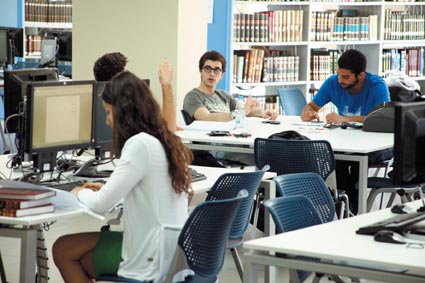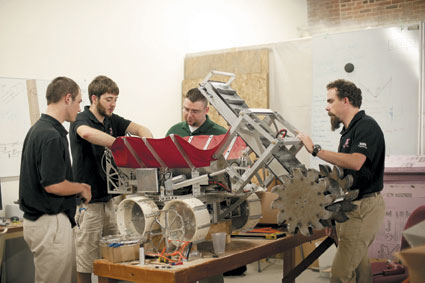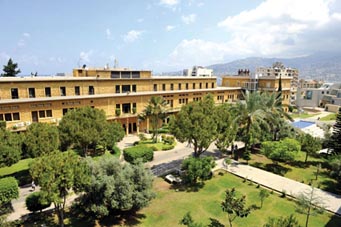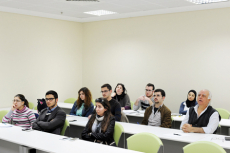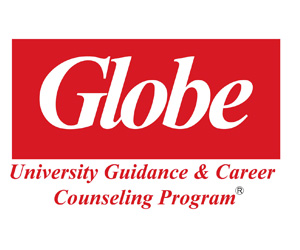The University of Balamand Faculty of Library and Information Studies
The past twenty years have witnessed many changes, particularly in terms of pedagogical approach, communication technologies, and the importance given to communication in the learning process. These have resulted in a radical development of all that relates to the learner, learning strategies, and the central role of knowledge resources.
In this era of technological change, it has become necessary to focus attention on academic programs concerned with methods of information conservation and the means of communication used to transfer this information. Information, whether related to heritage, arts, science or whatever, is acquired through books, the media, and social networking. In all cases, it is necessary to keep abreast of progress by coming up with academic programs that provide the education required by the labor market and its needs.
The University of Balamand has thus established the Faculty of Library and Information Studies to maintain these important trends, particularly by focusing on the role of libraries as centers of learning, and by highlighting the role of museums and heritage sites as places of communication for the past, present, and into the future.
The new Faculty’s curricula are aimed at making students aware of the increasing needs of society, both locally and in the region, and at both Bachelor and Master levels, along with the possibility of offering specialized diplomas under the scheme of continuing education. These curricula are focused on the requirements of the labor market, enabling the graduates to be operational immediately. The graduates will have unlimited employment options, in libraries, schools, the public sector, private institutions, and large corporations, as well as in museums, archaeological sites and permanent exhibitions.
This step accords with what is happening in universities around the world. The Faculty has therefore decided to construct its programs in the light of this international academic experience, adopting learning approaches that concentrate on training and participation. The Faculty has taken into account international standards in the formulation of both the curriculum content and its learning outcomes. It is cooperating with international and local experts to guarantee quality assurance, and eligibility for national recognition and international accreditation.
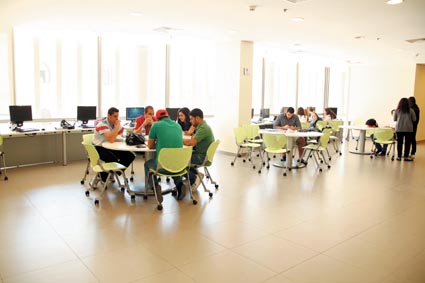
Bachelor Degree in Library and Information Science (BLS)
What is Library and Information Science Program (LISP)?
The field of LISP allows you to find, organize, store and spread information to all those who need it to find answers.
This department aims to:
• introduce you to the wealth and power of information in its printed and non-printed forms (including the Internet and the World Wide Web)
• supply you with the skills that aid in library management and the use of new technology
By the end of the undergraduate program, you will be able to:
• appreciate the value and power of information in all its forms
• acquire the relevant information according to the user’s needs and requests
• manage the different operations in libraries and information centers
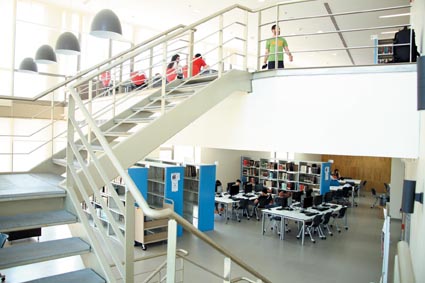
Is this program available in any other institution in Lebanon?
No, the undergraduate program as offered by UOB is the only one of its kind in any university in Lebanon. UOB is the sole institution to offer a Bachelor degree in Library and Information Science.
What are the admission requirements?
Holders of the Lebanese Baccalaureate or its equivalent are entitled to join the program on the basis of recruitment stated in the university catalogue.
What job opportunities do the graduate has?
With BLS, one can apply for jobs in:
• School and university libraries
• Public and private libraries
• Archive or information centers in banks, publishing firms, hospitals, international and government organizations.

How many credits do the student needs to graduate?
Student will graduate upon acquiring 90 credits divided as such:
• 21 University requirements
• 6 Faculty requirements
• 6 Electives
• 39 Core credits
• 18 concentrations credits
What kind of courses will the student be dealing with?
Courses will be divided into three main groups:
• Basic general education through university requirements such as languages and cultural studies
• Specialized education in LIS that provide a good grounding in theories and principles of the profession
• Practical experience (through the practicum program) to develop skills in the subjects with a focus on the electronic aspect.
What are electives?
Electives are varied courses in fields of your interest such as history, music, literature, business, philosophy... These are courses where you enrich your knowledge and culture in different topics outside your specialization.
What are concentration requirements?
Concentration requirements are courses that the student takes to acquire knowledge in a specialized field related to Library and Information Science. These courses provide advance training in a contemporary interdisciplinary aspect of this field.
The concentration options provided through LISP are:
• Information Technology
• Multimedia
• Business & Management
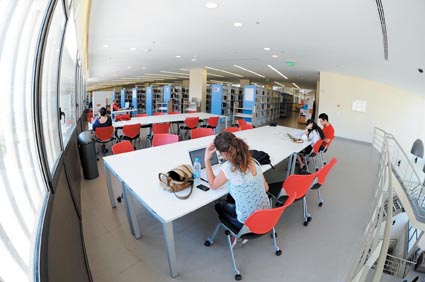
What languages do students need?
The language of instruction is English; however, for the student professional development, proficiency in Arabic and French is a bonus.
To develop such skills in these languages, the student will be introduced to the technical laws to be able to work with the Lebanese educational environment.
Can student join LISP along with another degree as a minor?
Yes. If the student is in a Department that supports the minor option, then you may acquire a minor degree in LISP after completing 18 credits. This will equip you with additional skills crucial to your domain and increase your chances of acquiring a job.
Will the student acquire any experience before graduating?
Yes. An important part of the study occurs in a practicum over 2 semesters. During this period, students will work in a library for a minimum of 120 hours passing through the various services.
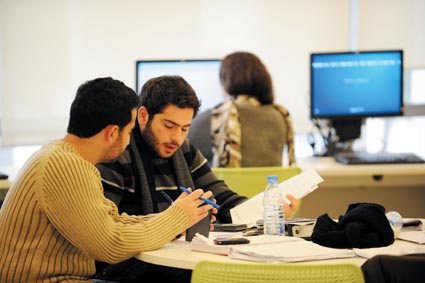
MASTER DEGREE IN LIBRARY AND INFORMATION SCIENCE (MLS)
Vision
Our mission is to create information professionals who view access to information as an important component of a democratic society.
Mission
The program seeks to graduate professionals capable of leading and directing centers or institutions that deal with information management such as libraries, research and archive centers, etc.
Learning Outcomes of the Program
Graduates of this program will be able to:
• Apply technology to information management to enhance accessibility to information;
• Supervise and manage all functions related to access to information in school, public, national, or academic libraries;
• Supervise and manage access to information in research centers;
• Supervise and manage access to information in archive center;
• Create a documentation system for a media center;
• Promote and activate the use of information for research in any field;
• Be active in promoting latest applications to keep their institutions at the forefront of the teaching and learning efforts;
• Initiate new approaches to access to information to help serve the users of the institution;
• Work towards a doctorate degree in the field.

Areas of studies included in this program
Information includes any fact, data, or knowledge, recorded in any form for the purpose of communication, research, or other intellectual, or recreational activity. Accordingly, information found in books, documents, artifacts, electronic and digital formats, is information that needs to be managed and made accessible.
The Faculty of library and Information Studies will provide an academic program that deals with this area of study. It will have an interdisciplinary approach and will work closely with other faculties. The areas of studies will include:
• Library organization and management;
• Document management;
• Archival management;
• Digitization and Preservation
management.
Options offered by this program
1. MLS in Library & Information Science
This 33-credit program seeks to graduate professionals capable of leading and directing centers or institutions that deal with the management and organization of information such as libraries, hospitals, research, archive centers, and other cultural organizations, as well as banks, corporations, government and social services agencies. It involves modules in the following fields:
• Information professions & knowledge management
• Information networks
• Infometrics
• Records Management
• Management of libraries and information centers
• Heritage Management
• Organization & retrieval of information
• Project Management
• Internship
This is a 2-year program for full-time students; it may take a maximum of 4 years for part-time students.
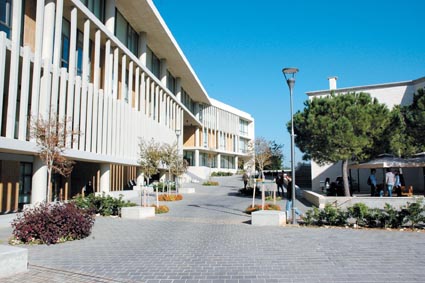
Job opportunities
• Corporate information manager
• Archives and document manager
• Media and electronic publishing manager
• Academic, public, or special library manager
• Business information specialist
2. MLS in School Library and Media Centers
Through this 33-credit program students are expected to master the principles and processes of building, classifying, organizing and integrating a school library media center in an educational environment. This will allow them to become professionals capable of supporting the school curriculum. The program of study involves modules in the following fields:
• Information professions & knowledge management
• Information networks
• Infometrics
• Organization & retrieval of information
• Collection development
• Resources & services for children & adolescents
• School library and media administration
• Educational Technology
• Instructional Design
This is a 2-year program for full-time students; it may take a maximum of 4 years for part-time students.
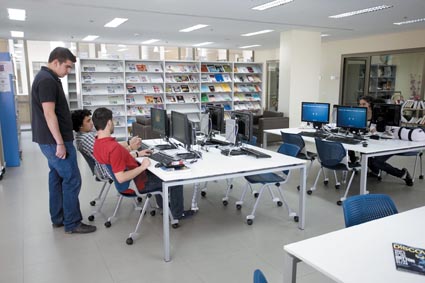
Job opportunities
• School library manager
• School library and media administration
• Project leader in educational technology
and instructional design.
3. MLS in Information & Digital Resource Management Through this 33-credit program students are expected to master the principles and processes of information collection, organization, retrieval, preservation, management, and dissemination. This will allow them to become professionals capable of playing a leading role in societies that have come to rely more and more on information and the technologies associated with it. The program of study involves modules in the following fields:
• Information professions & knowledge management
• Information networks
• Infometrics
• Digitization for preservation and access
• Records management
• Global trends in information
• Information systems policies
• Search engines and information retrieval
• Human-computer interaction
This is a 2-year program for full-time students; it may take a maximum of 4 years for part-time students.
Job opportunities
• Corporate information manager
• Archives and document manager
• Media and electronic publishing manager
• Academic, public, or special library manager
• Business information specialist

MASTER DEGREE IN MUSEUM STUDIES & CULTURAL HERITAGE MANAGEMENT (MMCM)
Vision
Our mission is to create information professionals who view access to information as an important component of a democratic society.
Mission
The program seeks to graduate professionals capable of leading and directing centers or institutions that deal with cultural information management such as museums, research and archive centers, art galleries.
Information for prospective students
The growth of museums throughout the Middle East, the Gulf Region and West Asia Region indicates that there is a new museum paradigm in the 21st Century. This Master Program combines academic and museum studies courses with an emphasis on practical museum training. It is offered in association with Lord Cultural Resources.
What are the Master program’s Objectives?
• To provide foundation training for all those working in museums in the region.
• To offer specialized courses in museum studies and museum practice so that residents of the region who wish to work in museums will be able to acquire the skills to do so. On the other hand, employees from outside the region will obtain an orientation for applying their skills to the specific environment of the Middle East.
• To take full advantage of the superb quality of the museums currently under construction, which are part of the region as best-practice environments in which to study, learn and work.
• To secure employment for promising students in museums in the region and throughout the world.
• To further the aspirations of Lebanon to be the cultural center of the Middle East in the future.
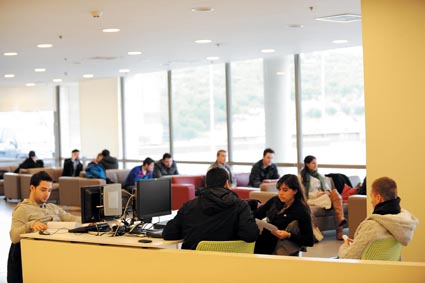
What does this program involve?
The Masters program in Museum Studies and Cultural Heritage Management draws from a range of modules across the Faculty of Library and Information Studies and comprises:
• 33 credits
• 6 core modules
• 3 optional areas of concentration
• 9-week internship / 40 hours per week: hands-on, practical training.
• An extended piece of written work - either a Final Research Project or a Directed Applied Research.
How long does it take?
This is a 2-year program for full-time students; it may take a maximum of 4 years for part-time students.
What are the entry requirements?
This program of study is mainly for residents of the Middle East and Arab countries who wish to work in museums, heritage sites and cultural institutions.
Who may join the program?
• Graduates of undergraduate programs in archaeology, art history, natural sciences, history, ethnography or other disciplines who wish to obtain professional museum qualifications in order to improve their chances for employment in the field.
• museums but lack museum studies training.
• People with non-museum based qualifications wishing to gain the knowledge, skills and competencies to undertake museum work at a professional
level.
• Corporate professionals seeking to upgrade their technical knowledge and skills for museum work.
Holders of BA or BS degrees coming from other backgrounds may join the programbut will have to attend the required bridging courses if the Admission Committee so decides.
Professionals may choose to enroll in one course or more without enrolling in the entire program. They will get a certificate of attendance issued by both the University of Balamand and Lord Cultural Resources.
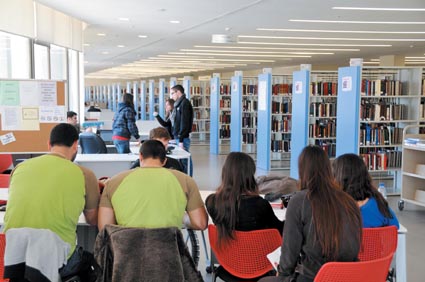
Job opportunities
• Museum Director
• Curator (curating exhibitions worldwide)
• Archivist
• Museum Education Officer
• Art Gallery Curator
• Heritage sites manager (development & promotion)
• Cultural center manager
• Conservation specialist (Icons, manuscripts, etc…)
What are the core modules?
There are six core modules:
1.Theory and History of Museums
2.Management of Museums and Cultural Heritage Sites
3.Museum Collections: Theory and Practice
4.Curatorship: Museum Exhibitions, Curational Practice and Planning
5.Learning and Public Programming in Museums and Cultural Heritage Sites
6.Conservation and Preservation of Collections and Sites
What optional modules are available?
Students enrolled in the Masters Program can concentrate in:
• Collections Management
• Exhibition Development/Design
• Museum Management and Leadership
What does internship involve?
The Internship Program is designed to broaden the experience of students embarking on professional careers in the cultural resources sector. Interns will:
• Work closely with a professional staff
• Assist with general research and exhibitions development
• Participate fully in current projects
• Work in different museums worldwide
Seminars and workshops will be held at the Library Learning Center, and the permanent ethnographic exhibition on the main campus, and on the Alba campus in Beirut.






